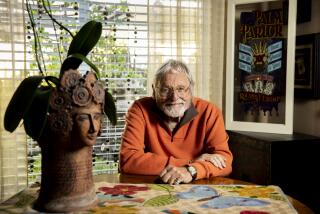DAUGHTER RECALLS LIFE WITH FATHER
- Share via
J udith Still Headlee, in a recent interview at her Mission Viejo home, recalled what life was like with her father, composer William Still Grant who died in 1978 in Los Angeles after years of fame--and later neglect--as America’s first black classical composer.
Since taking over the family music publishing company, William Grant Still Music, in 1980, Headlee, 44, has rekindled interest in her father’s music and helped establish the Still archives at the University of Arkansas.
“There were always people around the house (on Cimarron Street in Los Angeles) because my parents were very well liked,” Headlee remembered. “This was ironic because my parents were told when they decided to marry that they would not have any friends and be ostracized. Interracial marriages were illegal in those days. (Still’s second wife, pianist Verna Arvey, was white. The couple married in Mexico in 1939).
“But it didn’t happen that way. Good friends remained good friends, and the ones that left weren’t friends anyway. It was a good way to weed out the chaff.
“My father was a gentle, kind person who was very compassionate. He loved to cook, he was good at gardening and had a Victory Garden during the war, and because we never had much money, he made furniture, toys and puzzles for us (she has an elder brother, Duncan).
“But he composed every day. There was music around the house all the time. I thought everybody was like that.
“But he was also a man of contradictions. He was a colored man married to a white woman, an American composer who wrote lyrical music instead of avant-garde noise, a conservative Negro when everyone was a Democrat and liberal, and a spiritualist when coloreds were all Baptists.
“My father had an aversion to the word ‘black’ because it tends to suggest that the black is over here, the white is over here and they’ll never see eye-to-eye. His favored term was ‘colored,’ which calls up so many beautiful colors.
“My parents weren’t bitter or hostile, though. They wouldn’t have made it if they had been bitter. My father’s faith in God kept him going and got him through the very bad periods.
“My mother was soft-hearted, dedicated to people and had lots of idiosyncrasies. They made a good team. She stood firm once she made up her mind. Maybe that was how she survived the onslaughts. Together, they tried to ignore them.
“For my father, music was a way to bring the races together. It was a catalyst for fostering universal brotherhood. For that reason, he was devastated by the way he was neglected in the 60s. The radical temperament of the times made everything literally black or white--or forget it.
“Coloreds hadn’t done anything and couldn’t do anything because they were oppressed and downtrodden--that was the rhetoric. He felt bad. He felt that his achievements had been ignored.
“It was as if he didn’t exist. Performances dwindled, money dwindled, and they went into debt. He died thinking that he was a failure.
“So far this year, there have been more than 200 performances of his music, in Argentina, Sweden, Germany and Great Britain as well as in the United States. It seems that other countries know more about my father than Americans do.
“Something is happening. There’s interest there. I think there are two reasons for it. There’s a new racial tolerance. Bigotry is easing up and there’s a better awareness of human nature and achievement.
“And also there’s a public backlash against the tendency for modern music to be so dissident. No-talent people--my father called them tin-pan clangers--insist that you have to write that kind of music, and people are told that if they don’t understand it, it’s their fault. But they don’t have to do that anymore. My father could write appealing and pleasurable music, and that made him an oddball and the object of jealousy from other composers.
“Things were always so bad, I always wondered if I would be able to do anything at all with his music. But a performance of his 1958 opera ‘Minette Fontana’ in Baton Rouge in 1983 was a real success. I found out then the music that I had was a treasure.
“It’s an overwhelming job to make it accessible. But giving my father’s music to the world is one of the most worthwhile things anyone can do. The music is beautiful and certainly worth hearing.”
More to Read
The biggest entertainment stories
Get our big stories about Hollywood, film, television, music, arts, culture and more right in your inbox as soon as they publish.
You may occasionally receive promotional content from the Los Angeles Times.










